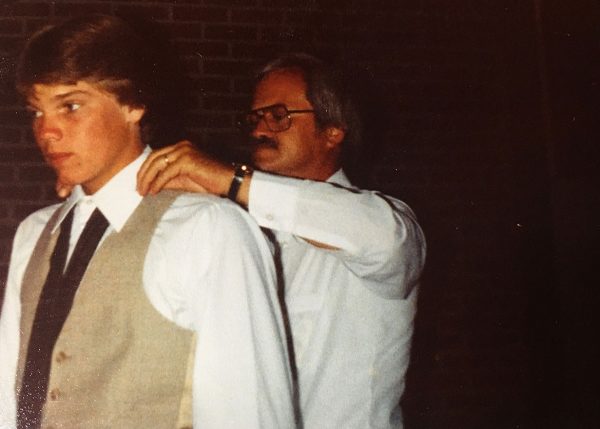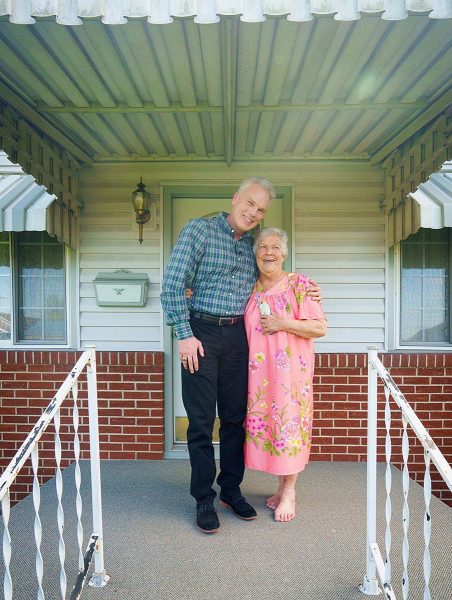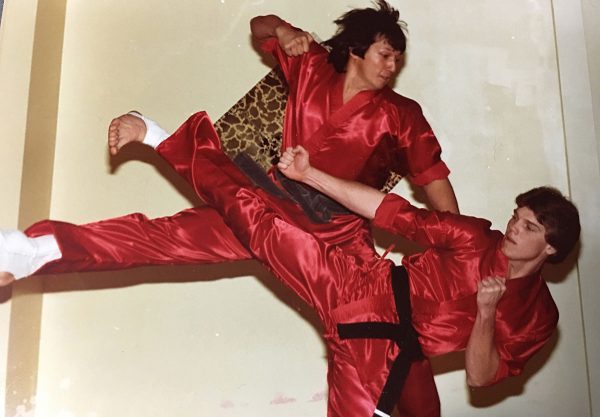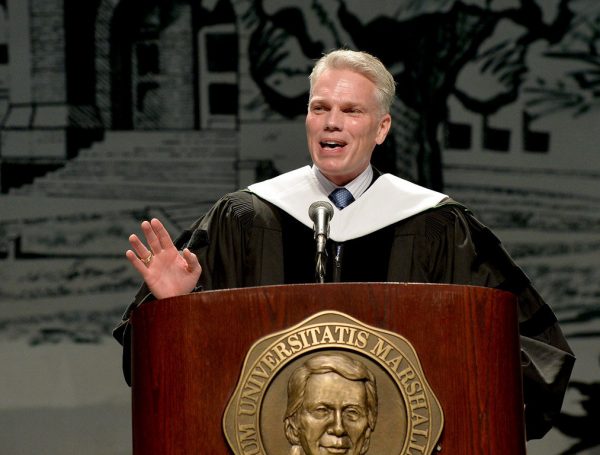About Brad D. Smith
Brad D. Smith is the President of Marshall University, Co-Founder of the Wing 2 Wing Foundation, and a Dedicated Advocate for West Virginia
To truly know Brad D. Smith is to understand his dedication and commitment to his home state of West Virginia.
Growing up in the Mountain State, Brad is all too familiar with the challenges that West Virginians face when it comes to opportunities, educational resources, and access to information. His drive to give back to the home that built him led to his current role as the 38th President of Marshall University – the first-ever alumnus to hold the position – and the creation of the Wing 2 Wing Foundation in 2019, a nonprofit focused on uplifting West Virginia, alongside his wife, Alys. Through their efforts, Brad and Alys seek to champion human dignity while unleashing human potential in underserved communities throughout the region. Since starting Wing 2 Wing, the foundation has branched out to support other initiatives built to elevate West Virginia, including Ascend West Virginia — an incentive program that promotes remote work and brings new families and talent to the state.
Prior to Brad’s current focus on academia and philanthropy, Brad is probably best known for his leadership as CEO and chairman of Intuit, Inc. from 2008 to 2019, and executive chairman until 2022.
During his 11-year tenure as Intuit’s CEO, he transformed the business structure from a North American desktop software company into a lucrative global cloud-based platform. Born from the drive to innovate across all layers of the organization, under Brad’s guidance, Intuit’s transformation shifted how the company served its global ecosystem of consumers, small businesses, and partners. This led to historic record growth that nearly doubled the company’s revenue and increased its stock price to more than 500% while simultaneously positioning Intuit as the leading enterprise in its space, both then and now.
For Brad, Intuit’s accomplishments mean nothing if the people he served with weren’t filled with passion and operating in an environment where they could do their best work. Brad preserved and strengthened Intuit’s culture as a mission-driven, customer-obsessed organization that empowers all employees through a shared commitment to customers and a dedication to continuous innovation to make a difference in the world, one customer at a time.
It is in this union of leadership excellence and unrelenting innovation that left Brad largely recognized as one of Silicon Valley’s leading CEOs, during and after his time there. But his success at Intuit is just one chapter of Brad’s story. His decision to step down from his position as CEO was born of a desire to give back to his roots and his extensive tenure leading a Fortune 500 company while successfully instituting powerful change culminated in the perfect foundation for his current pursuits.
“I became aware my success was no longer singularly dependent on my individual ability, but now depended on my skills in translating that experience into capability in others as well.”
From Humble Roots to Transformative Leadership
While Brad spent his career in the heart of Silicon Valley, his hometown, “the house that built him,” as he fondly calls it, couldn’t look more different.

“I grew up about as far from Silicon Valley as you can get in a small town in West Virginia called Kenova,” said Brad. “Population 3,100…if you round up.”
Kenova sits on the border of West Virginia, Kentucky, and Ohio, and is right down the road from his alma mater, Marshall University, where football legends like Randy Moss, Chad Pennington, and Byron Leftwich got their start and the iconic D’Antoni brothers thrilled basketball fans. It’s the kind of town where cheering on the high school team is a hallowed tradition, a handwritten note (like the kind his mother taught him to write) is always appreciated and is a place where everyone knows at least a little something about one another. In a tight-knit community where everyone is ready to lend their neighbor a helping hand – no questions asked – its historic architecture and rich history, combined with its warm hospitality, make Kenova an endearing place to call home.
But sadly, in 1970, when Brad was only six years old, the town was hit with a tragedy — one that not only taught him that life is a team sport, but one that changed him and his trajectory forever.
Brad vividly recalls being at home with his family on a rainy November night, when the television’s news ticker announced that a plane carrying the Marshall University football team had crashed at the Tri-State Airport. All 75 passengers, including players, coaches, donors, and community leaders, perished.
The memories of watching a nearby mountain burn from his bedroom window as sirens screeched over the rain, hoping his older cousins (who were volunteer firefighters and EMTs at the time) were safe as they headed out to the scene, burn bright in Brad’s mind. Still, the togetherness of the community helps eclipse some of the bad.
“I watched a community come together,” Brad later recalled. “[I saw] a university step up in a way that had never been done before. I watched neighboring universities offer assistance, and I saw a football program and its community rise once again – from ashes to glory.”
Brad cites the Marshall plane crash as the moment in which he learned what he considers to be life’s greatest lessons: integrity, humility, and teamwork.
“I’ve carried those values with me through everything I have taken on since,” he says. “And those lessons have made all the difference.”

A Lifetime of Life Lessons
Brad wasn’t born a CEO. His leadership skills have been honed from a collection of life lessons taught by his parents, his martial arts training, and the hard-earned lessons from success and failures throughout his impressive career.
At 14 years old, Brad enrolled in a martial arts academy during a phase that he describes as “unconsciously incompetent.”
“What I didn’t anticipate at the time was that the greatest lesson would not be the martial art techniques themselves, but rather a leadership philosophy that would guide me through the rest of my life,” Brad said.

As this realization struck, not only did it bring forth a reminder of his time in training, it clicked with an old memory of his father.
His foray into martial arts began with his “white belt” training. The white belt represents purity and a blank slate in which the thirst for answers and knowledge is the guiding incentive to push forward. As his skills developed, Brad began collecting the answers his younger self was so eager to know, later passing along his wisdom to his own set of students beginning their journeys in the white belt phase. This was his brown belt phase and arguably one of the biggest catalysts that set him on the path toward his future.
“It was at this stage that I became aware my success was no longer singularly dependent on my individual ability, but now depended on my skills in translating that experience into capability in others as well,” he said.
While his martial arts training taught him the fundamentals of how to lead, learning how to identify his own vulnerabilities is what allowed him to unlock the personal growth needed to reach his full potential.
At one of his first-ever jobs, Brad’s boss took notice of his West Virginia twang and, unfortunately, did not find it charming. Suggesting that it was an inherent flaw that would lead to stereotyping, Brad was sent to executive communications courses to “fix the bug.” Try as he might, Brad’s vernacular was afflicted by the country lilt of a small-town boy who couldn’t outrun his roots.
“I began to feel like a failure, but then I noticed something – whenever I would participate in a group setting or give a presentation, people would ask, ‘Who was that guy with the twang?’ Smith said. “My accent differentiated me from the crowd, and I began to realize it was a good thing.”
Toward the end of his life, Brad’s father was the mayor of Kenova and a real “man of the people.” Following an “ain’t”-laden Independence Day speech that compelled Brad to offer his father uToward the end of his life, Brad’s father was the mayor of Kenova, and a real “man of the people.” Following an “ain’t” heavy Independence Day speech that compelled Brad to offer his father unrequested feedback on the way he spoke, it was Brad who learned an important lesson that day.
“Son, people prefer their leaders with flaws, because it makes leadership more attainable for the rest of us,” his father said. “This is who I am, and each of them in the audience have their own opportunities to improve. But once they recognize that I can be mayor without being perfect, then maybe one of them will be inspired to be mayor after me, because they know they ain’t perfect either.”
Each of these powerful life lessons — acceptance of who you are, quenching the thirst for knowledge of those you mentor, embracing the collective imperfection of the human experience — have helped Brad boil his life down to three attributes — intellectual curiosity, humility, and grit.
Wrapped in the compassionate leadership philosophy he often cites, “never mistake kindness for weakness,” he has been described as the Mr. Rogers of business leaders.
Distilled into a structure that any of us can follow, these lessons have illuminated life and leadership for Brad, as well as anyone who has had the pleasure of working alongside him. Perhaps that’s why Intuit honored him by naming their main office building at the Intuit headquarters campus, “The Brad D. Smith Building,” displaying his signature phrase, “Work hard. Be kind. Take pride.”

Career & Education
After graduating from Ceredo-Kenova High School, Brad attended The United States Military Academy (West Point) in New York for a semester before he decided to return to West Virginia to attend Marshall University. Here, he received his bachelor’s degree in business administration. As a loyal son of Marshall, this marked the beginning of his lifelong relationship with the institution.

Brad’s business career began while he was pursuing his master’s degree, starting with a sales role at PepsiCo. Gaining experience, he would take positions at both 7-UP and ADVO before being hired as a Senior VP of Marketing & Business Development with ADP. It was here that Brad honed his skills in product marketing, management, and development, which ultimately led him to become VP & GM for the Account Central & Developer Network at Intuit in 2003.
Brad worked within the company’s Consumer Tax Group and Small Business divisions – home to TurboTax, Quicken, QuickBooks, and its portfolio of other small business products – where he developed innovative growth strategies that helped Intuit strengthen its position in the financial software industry.
In 2008, Brad became Intuit’s CEO, a role he held for 11 years. In 2019, he stepped down and transitioned to Executive Chairman. Around this time, he also turned his focus toward giving back to West Virginia through his nonprofit organization, Wing 2 Wing.
Driven by a commitment to share his lessons in leadership and expand opportunity in West Virginia and beyond, Brad stepped into the role of Marshall University president in 2022. That same year, he joined the Board of Directors for JPMorgan Chase, bringing his operational expertise and values-driven leadership to one of the world’s leading financial institutions. Today, Brad serves on the Board of Directors for Amazon as a member of the Audit Committee and is an Advisor for the DignifiHealth board of directors. He also co-chairs the Southern Regional Education Board (SREB)’s Commission on AI in Education. Brad previously served on the board for Humana Inc. from 2022 to 2025 and has also held board positions with Nordstrom (as Chairman), Momentive (formerly SurveyMonkey) and Yahoo.
After becoming President of Marshall University, Brad dedicated himself to transforming the institution through strategic initiatives such as the ‘Marshall For All, Marshall Forever’ plan, which expands educational opportunities for students throughout the Mountain State. The plan’s main focus is to eliminate student debt and help students achieve 100% job placement by 2037. This initiative has positioned Marshall University as a North Star for other institutions to support students of all economic backgrounds, underscoring his own nonprofit’s commitment to empowering communities throughout West Virginia.
Building a Better Future for West Virginia
Following Brad’s decision to step down as CEO from Intuit, he continued to work as a champion for the overlooked and underserved – giving back to the communities that have long supported him and so many others throughout the Mountain State.
In addition to his and his wife’s work through the Wing 2 Wing Foundation and Ascend WV, they have also donated more than $25 million to West Virginia University, which would later establish the Brad and Alys Smith Outdoor Economic Development Collaborative. This initiative works to bolster West Virginia’s economy by incentivizing businesses to move and stay in the state, enhances outdoor access for people of all abilities, and empowers communities through the Outdoor Infrastructure & Community Development Program.
In 2015, Brad and Alys further demonstrated their dedication to education by establishing the Brad D. Smith Family Scholarship with a $10 million donation to support underserved students in West Virginia and Ohio. They also invested $25 million in Marshall University’s School of Business, resulting in the creation of the Brad D. Smith Student Incubator and the naming of the Brad D. Smith Schools of Business, aimed at fostering entrepreneurship throughout the state.
Today, Brad resides in West Virginia with his wife Alys, and daughters, Payton Smith and Devon Smith Heyn, with no plans on slowing down in his mission to help West Virginians realize their dreams, open doors, and preserve the natural beauty of Appalachia for new and long-standing residents alike.
